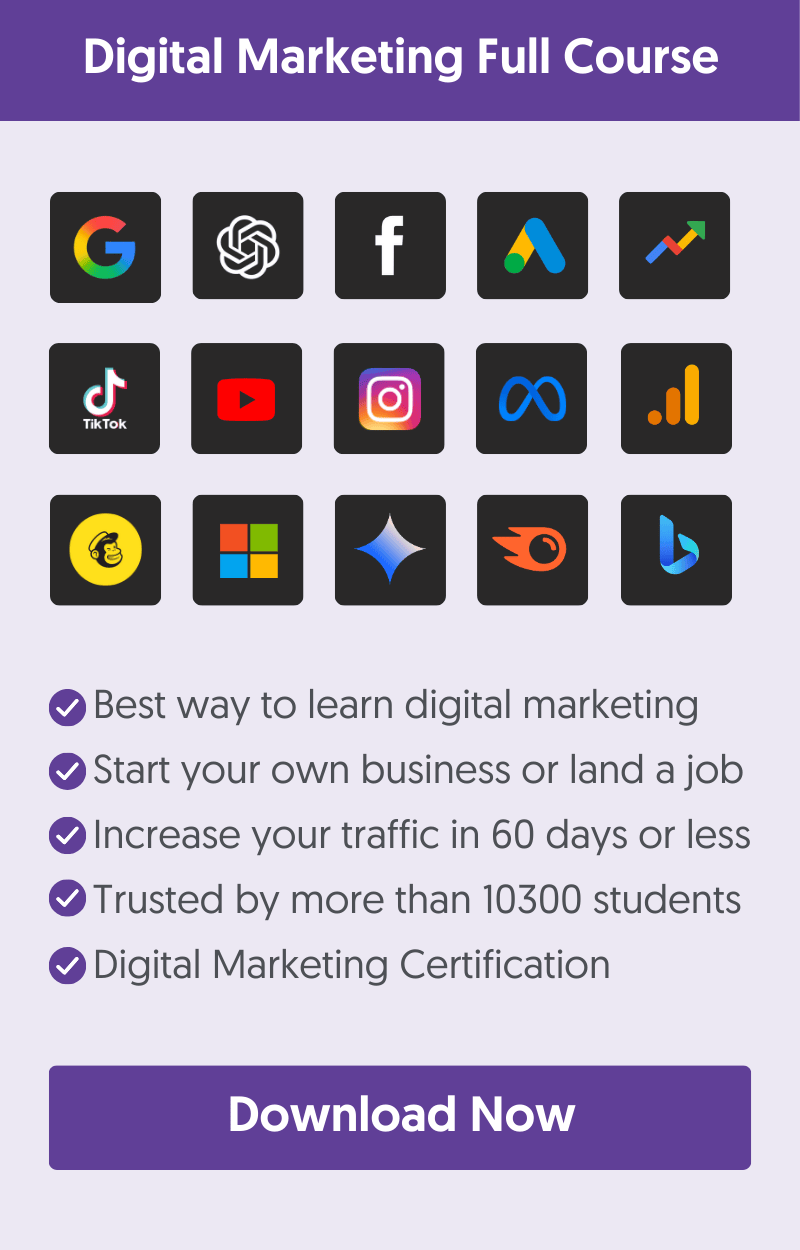Digital marketing is one of the most important marketing processes any business can leverage. It ensures brands from all industries can connect with their target audience across various channels, from social media to email and search engines.
Unfortunately, the digital marketing landscape is complex and multifaceted. Excelling in everything from search engine optimization to social media marketing requires consistent investment in developing new skills, methodologies, and techniques.
Not every business has the internal resources to develop, manage, and run comprehensive digital marketing campaigns. That’s where digital marketing agencies come in.
What is a Digital Marketing Agency?
The world of digital marketing is broad, consisting of various methodologies for building brand visibility, connecting with customers online, and generating conversion opportunities.
Digital marketing agencies provide companies with access to groups of professionals trained in specific skills related to online marketing.
Digital marketing agencies can assist with SEO and content marketing, build email and social media marketing campaigns, help companies develop inbound marketing strategies, run conversion optimization tests, and evaluate various success metrics.
Often, digital marketing agencies work freelance or contract for companies that may not have access to all of the in-house expertise required to build a multichannel marketing strategy.
What Do Digital Marketing Agencies Do?
The scope of services offered by digital marketing agencies can vary. Some companies specialize in a specific aspect of online marketing, such as social media advertising. Many, however, will offer a broad range of services connected to all aspects of online promotion.
Most digital marketing agencies offer services in a modular format, allowing companies to mix and match the services they need based on their budget and access to internal resources.
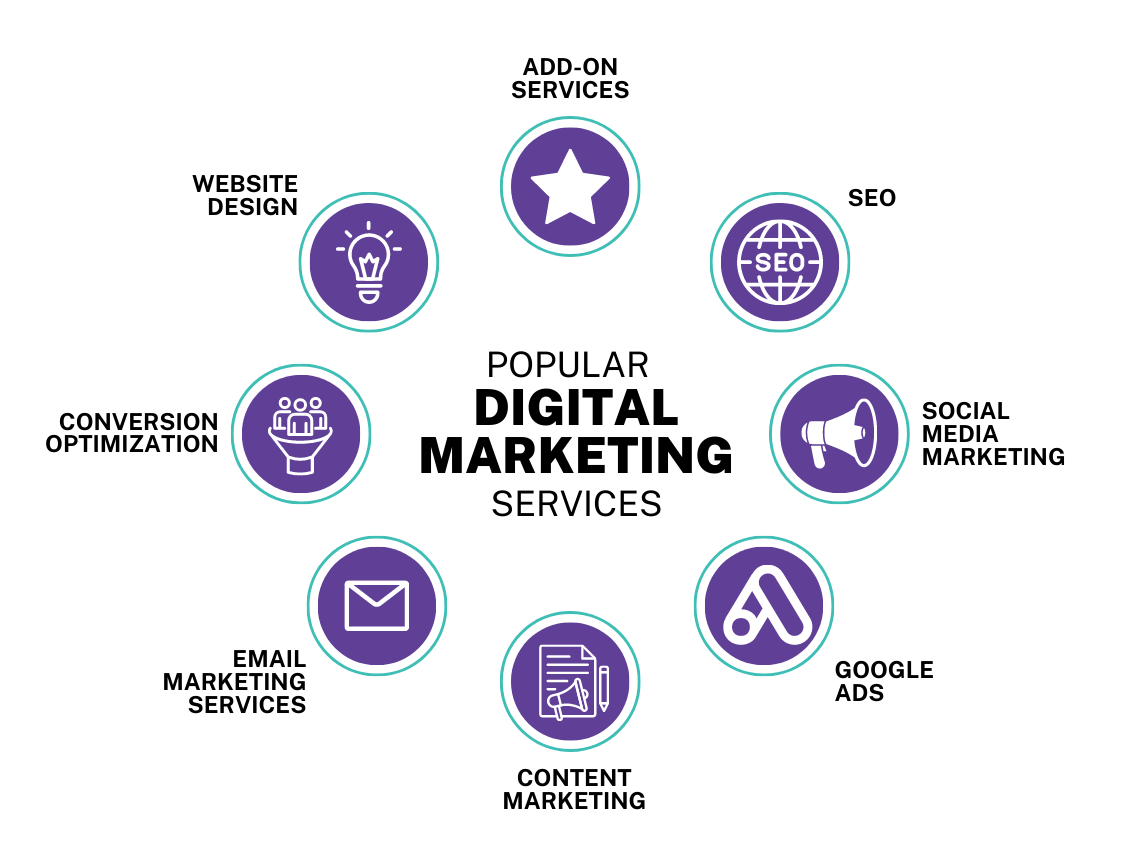
Some of the most common digital marketing services agencies offer include:
1. SEO Services
Search engine optimization (SEO) services are often one of the core solutions digital marketing agencies offer. SEO is one of the most effective techniques for driving organic website traffic and uncovering new leads.
Agencies may offer assistance with all forms of SEO, including on-page SEO (content creation and keyword research), off-page optimization (link building and guest blogging), and technical SEO (page speed optimizations, schema creation, and more).
2. Social media marketing
Another popular service offered by many digital marketing agencies is social media advertising. Social media support can cover everything from the creation and management of Facebook and Instagram ads to the development of organic campaigns.
Digital marketing agencies may run A/B tests on social campaigns to drive engagement and new opportunities. They can curate ad content and creative, look for ways to reduce paid ads' costs, and even leverage social monitoring and listening strategies.
3. Google Ads management
Many digital marketing agencies offer Google Ads management and PPC campaign management. While agencies can assist with all forms of paid ads, most prioritize Google Ads to help companies boost their appearance on search engine result pages, display networks, and more.
They can assist with setting up campaigns, exploring different ad formats, and reporting on campaign performance. Some agencies also create audiences and customer profiles on behalf of companies.
4. Content marketing services
Often offered in conjunction with SEO services, content marketing services include creating, promoting, and distributing content to support all digital marketing types.
Agencies can help companies develop comprehensive content strategies with metrics and KPIs to track.
They can also assist with choosing digital marketing channels to distribute and promote content and can create assets such as blogs, eBooks, and infographics. Some agencies also support the creation of podcasts and videos.
5. Email marketing services
Email marketing is a highly lucrative tactic for connecting with customers, nurturing leads, and forming relationships. Agencies can help businesses create and grow email lists, implement automated campaigns, and write engaging emails.
They can also assist with tracking campaign performance and segmenting audiences into different groups based on their interests or goals.
6. Conversion Optimization services
Many of today’s digital marketing agencies include experts capable of analyzing marketing data and creating campaigns based on core insights.
They can analyze client websites and provide insights into improving conversions with landing pages, pop-ups, and enhanced sales funnels.
They can also implement website changes to improve their effectiveness, often using A/B testing to define what kinds of copy, offer, and CTA buttons work best.
7. Website development and design services
Digital marketing agencies can assist with web development in addition to creating ads and content. They can build customized sites on behalf of their clients and handle front-end and back-end development needs.
They can develop site maps and page layouts based on customers' needs and consistently monitor and manage websites on the back end.
8. Add-on services
Some digital marketing agencies can also provide add-on services, such as consultation for companies who need help planning a content schedule or marketing strategy.
Certain businesses also offer digital marketing training to existing team members to help them use different marketing strategies in the future.
How Does a Digital Marketing Agency Make Money?
Digital marketing agencies can generate revenue in various ways. The exact pricing models and strategies each company uses can vary depending on the services it offers and the customers it wants to serve.
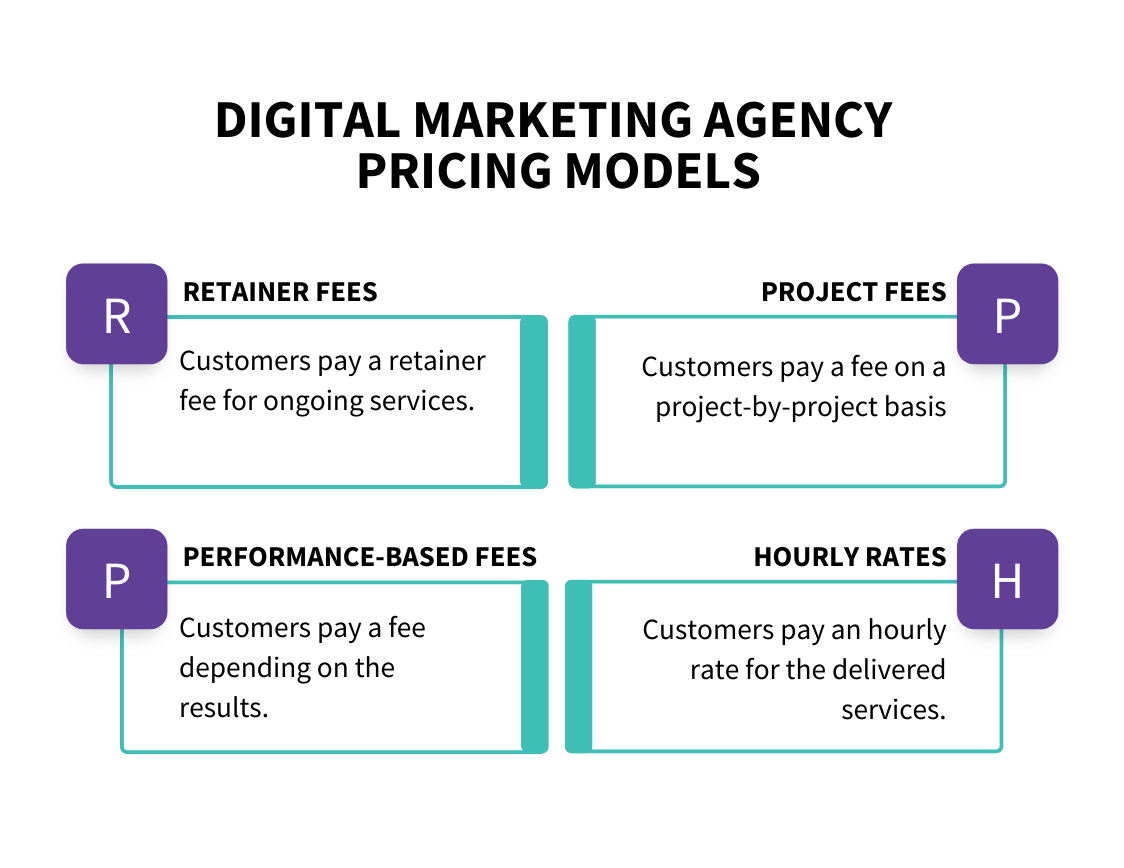
The most common options include the following:
Retainer fees: Digital marketing is often a long-term, consistent investment for many companies. Businesses may be asked to pay a retainer fee for ongoing services to continue working with the same agency.
This fee will cover the cost of the services the customer wants to access, which are often paid monthly.
Project fees: Companies looking for temporary assistance with a specific project may pay for digital marketing agency services per project.
For instance, a company may pay a one-off fee for a website redesign, comprehensive social media campaign, or SEO audit. Project fees are often selected based on the amount of work involved in the project.
Performance-based fees: Certain digital marketing agencies offer different pricing levels based on the results they can deliver for a client. In these situations, companies typically pay more based on the results they achieve.
However, many companies avoid this pricing strategy because digital marketing results aren’t always predictable.
Hourly rates: Many smaller digital marketing agencies charge an hourly rate for their services, often for smaller projects with limited scope.
For instance, a company may charge an hourly fee for a consulting project or an SEO audit.
Read our guide below for more details on how to make money running a digital marketing agency.
Digital Marketing Agency Team Structure
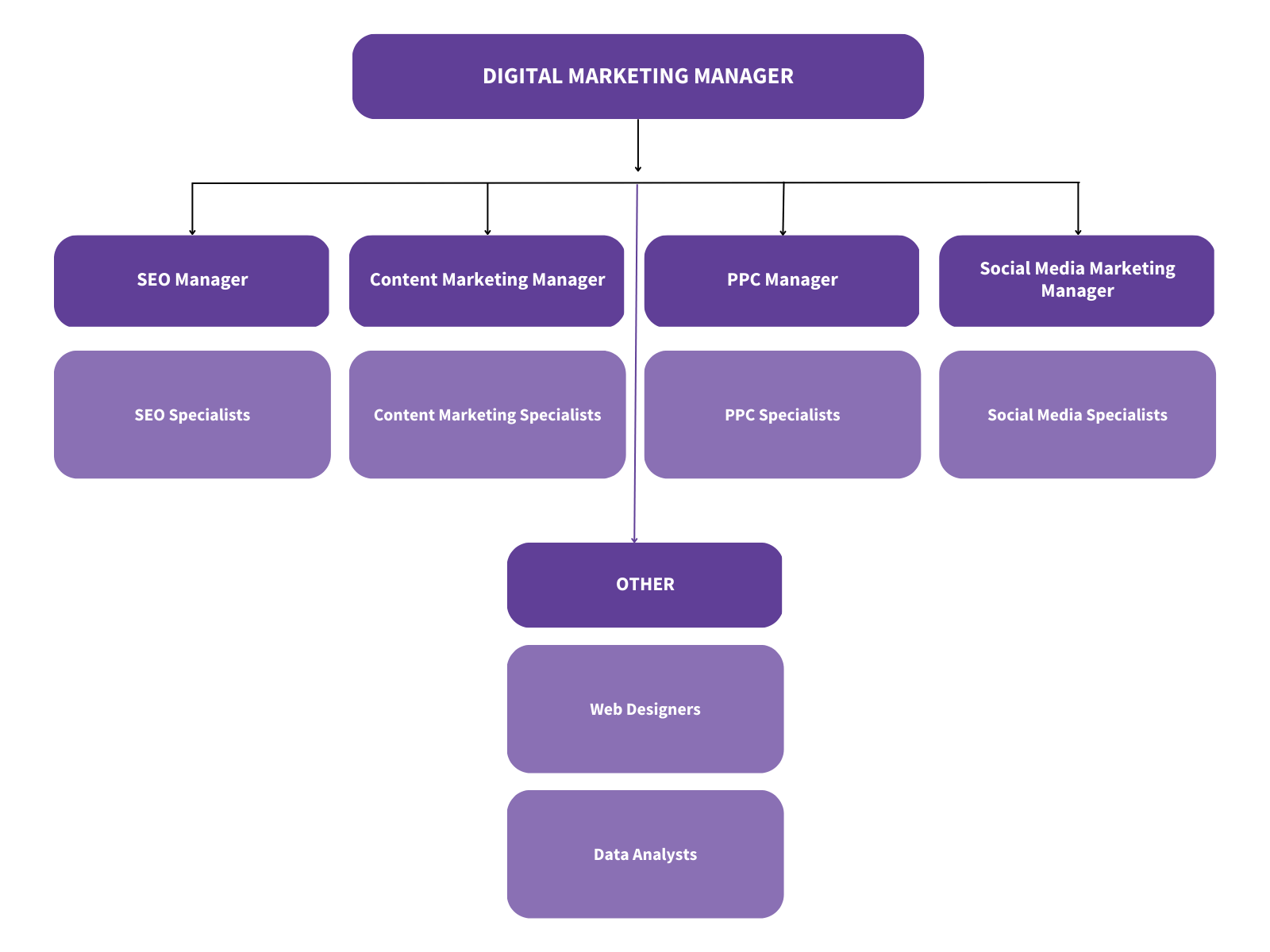
Because the scope of services offered by a digital marketing agency can be variable, the structure of the team you work with may vary, too.
Digital marketing teams typically consist of several different professionals, all with their own areas of expertise.
While the exact individuals in your agency may vary, some common digital marketing experts include:
Digital Marketing Strategists
Strategists in a digital marketing agency are similar to digital marketing managers. They develop, implement, and manage each business’s strategy.
They use analytics, metrics, and market research to develop comprehensive, multi-channel marketing campaigns.
Content Marketing Specialists
Content marketing specialists are responsible for developing the digital assets used in online campaigns. They can consist of writers trained in SEO who can produce blogs, eBooks, and whitepapers.
Some content creators also specialize in developing visual or audio content, such as webinars, podcasts, infographics, and videos.
SEO Specialists
SEO experts in a digital marketing agency are responsible for all forms of SEO, including on-page, off-page, and technical optimization.
They can conduct website audits, keyword research, and develop organic search campaigns.
PPC Specialists
PPC specialists focus on developing paid campaigns for channels like Google Ads and Facebook.
These professionals assist companies with setting marketing budgets, creating campaigns, exploring different placement and content production methods, and optimizing campaigns to improve ROAS.
Social media managers
Social media managers are responsible for enhancing and optimizing a company’s social presence. They can assist with the development of social media profiles and content.
They can also help with social media listening, monitoring campaigns, and creating social media posts and schedules.
Web designers/developers
Website designers and developers work on the creation of online assets for a company’s website. They may manage a CMS (content management system) on behalf of a company, create website designs and wireframes, and implement new pages and components into websites.
Data analysts
Marketing data analysts leverage various forms of reporting and analytics to monitor campaign success and drive intelligent decisions. They run A/B tests to determine the potential of each type of marketing asset and monitor important metrics like return on investment, click-through rate, and customer churn.
How Do Digital Marketing Agencies Find Clients?
Digital marketing agencies can find clients using different techniques. The most effective methods are:
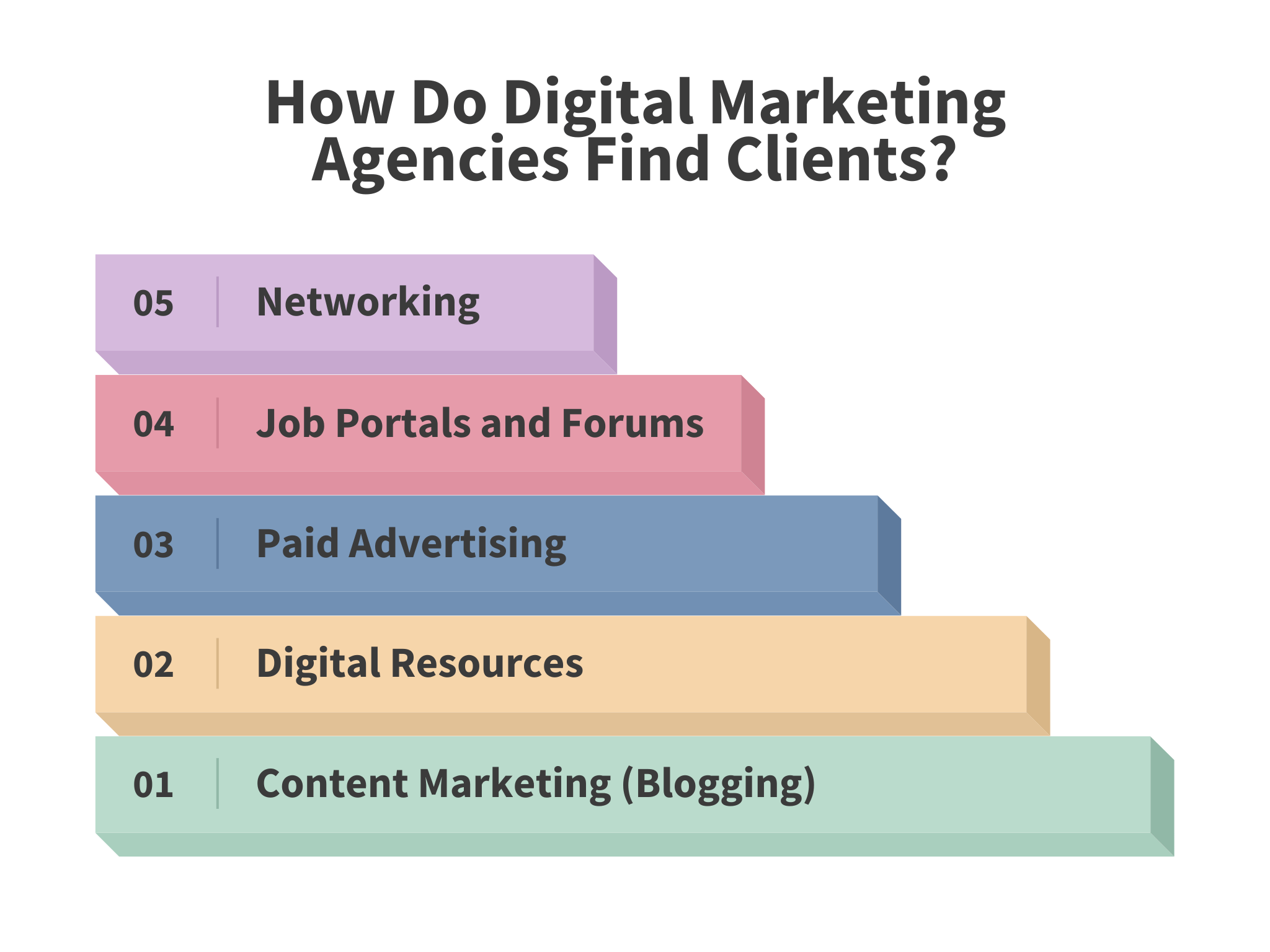
Content marketing (Blogging)
Many digital marketing agencies use the same techniques to generate leads for clients and acquire their own clients. They might use content to demonstrate thought leadership and improve their chances of being found on the search engine results pages.
Guest posting on high-traffic websites is another excellent way for agencies to expand their reach to new potential clients.
To get an idea of how much traffic you get using this method, here is a list of the top digital marketing blogs sorted by monthly search traffic.
Digital resources
Creating digital resources can be an excellent way for marketing agencies to collect new leads. Many of the top vendors today produce webinars, eBooks, and even online digital marketing courses designed to educate their audience.
Customers can often access these resources by sharing contact details and email addresses. This allows agencies to nurture leads over time.
Paid advertising
Like many companies, digital marketing agencies frequently use paid advertising strategies on channels like Facebook and Google to showcase their services to a specific target audience. For example, they may promote themselves on Google to customers searching for specific keywords like “Digital Marketing Agency near me.”
Job portals and Forums
Some digital marketing agencies seek out leads by posting their services on forums and job portals related to their industry. Some directory websites will list websites offering digital marketing services in specific niches to help companies reach their target audience.
Community networking
Digital marketing agencies often use communities and networking to increase their access to leads. To attract new customers, they could attend industry events as either guests or speakers. They can also connect with their communities through social media and channels like Reddit or Quora.
Social Proof
Many agencies also rely heavily on creating compelling websites that showcase valuable information about their services. Many brands create portfolios that showcase examples of their work in the form of case studies. Social proof is often a common solution digital marketing agencies use to develop credibility and trust.
Word of Mouth
Additionally, some agencies will use their own clients to help boost their chances of accessing leads. Many will ask their clients to recommend them to other customers in exchange for rewards like discounts on long-term services.
How to Start a Digital Marketing Agency
There’s no one-size-fits-all strategy for launching a digital marketing agency. Some companies focus on a single service, such as search engine optimization. As new experts join their team, they can branch out into new avenues.
Other digital marketing companies start with a single freelancer, who may gradually form connections with other professionals to offer a wider range of services to their target audience.
1. Develop your digital marketing skills: The first step in starting a digital marketing agency is to develop your marketing skills and abilities.
Taking courses and online classes and earning digital marketing certifications will ensure you can prove your abilities to potential customers.
Many agencies will continue to build on their skills and abilities over time, training team members in new forms of advertising, from affiliate marketing to PPC and content marketing.
Other core steps involved in starting a digital marketing agency include:
2. Developing business management skills: Aside from expanding your knowledge in the marketing landscape, you’ll need to learn how to effectively run a company. Taking courses on business management ensures you’ll be able to handle everything from invoicing and billing, to contract management when launching your own company.
3. Deciding which services to offer: As mentioned above, the services offered by a digital marketing agency can vary. Your company's services will often depend on the skills your employees have and your areas of expertise.
While offering a broad range of services is a good idea, you may want to start simple with a handful of related solutions, such as SEO and content marketing services.
4. Create a business plan: Define how you’ll operate your business and earn profits. You may want to run your company as a virtual brand, hire remote teams, or operate as a traditional business with a local office for customers.
You’ll need to register your business with the correct authorities, choose a logo and business name, and consider working with professionals on accounting and other legal matters.
5. Build your digital marketing team: Most digital marketing agencies consist of various professionals from different backgrounds. It’s unlikely you’ll be able to offer an entire range of services on your own. As such, you’ll need to hire professionals to assist you. You can choose between employing in-house professionals or working with remote staff.
6. Create your processes: As you grow your digital marketing agency, you’ll need to create a set of standard operating procedures to document the steps you’ll take to complete specific tasks. You’ll need to identify how you will onboard clients, deliver services, and keep your employees on the right track.
7. Establish a web presence: It’s crucial to have a compelling web presence capable of showcasing your skills to customers and earning their trust. You’ll need a professional website, a strong social media presence, and a strategy for attracting new leads. Creating a website where you can showcase your expertise and skills through case studies and reviews will be crucial too.
8. Leverage the right tools: Digital marketing agencies use a variety of tools to deliver services to their customers. You’ll need to ensure you know how to use crucial tools such as email automation platforms, analytics tools (such as Google Analytics), reporting tools, social media management tools and PPC advertising platforms.
9. Promote your business: You'll also need to commit to promoting your business using the same services you would deliver to your target audience. You can do this in various ways, leveraging content creation, social media marketing, and paid ads. It’s a good idea to create a digital marketing blog where you can showcase your thought leadership.
As your business grows and attracts new clients, you may find your strategies start to evolve. Just as you would consistently work on optimizing your clients' online presence to help them grow, you should also be focused on constantly finding ways to develop your company’s success.
For more information on how to start your own digital agency and become your own boss, read our guide below.
